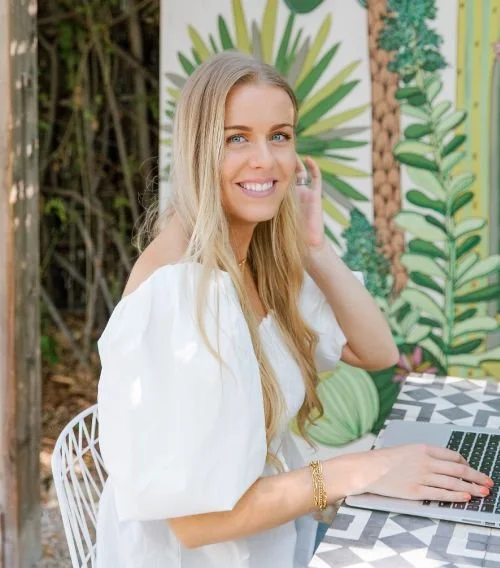Are You a Highly Sensitive Person (HSP)?
Alissa Boyer joined me this week to talk about the common traits of Highly Sensitive People like us and how we harness the power of being so attuned to our world.
Alissa is an HSP mentor who is leading this growing conversation about sensitivity. I love how she’s reframing it so we see how we can succeed because of our sensitivity, not in spite of it.
Melissa: When I first came across you on Instagram, it was like you were speaking out all the things that were in my head as a Highly Sensitive Person (HSP).
I’m passionate and impulsive — or you could call it decisive — and when I get ideas I'm like, ooh, I'm gonna run with it. But then what comes with that is the intersection with sensitivity where I would be like, oh boy, that was scary. What'd I just do? And I would kind of get stuck in these like zones of being stuck and frozen.
And to see you talking about those vulnerability hangovers, the perfectionism, the issues with self-worth, feeling everything so intensely… I was just like, yes, all of this.
“Once I started talking about being highly sensitive, I would get feedback from people like, oh my gosh, same here. And it was not only healing for me, but I know it’s healing for others to just to know that we’re not alone. And we’re not broken.”
Alissa: Thank you, I'm happy to speak about these things for HSPs because I feel like there's so much shame and so much of us feeling different and wrong in our experiences. I used to just feel like, oh, I'm the only person who feels this way or struggles with this.
It’s normalizing being different and not seeing it as a bad thing, just different. And there's strengths to it.
Melissa: It’s a gift. And yes it takes some support and some tools for us to get through some things, but the reframe on that is our success is because of our sensitivity, not in spite of it.
Alissa: Absolutely. It's way easier to be like, oh, this is holding me back. For many of us, that's probably how we spent a lot of years of our life.
What Are The Common Traits of Highly Sensitive People (HSP)?
Alissa: Being a highly sensitive person is a personality trait. It's not something that you need to have diagnosed by a doctor. I always compare it to being like an introvert or an extrovert. Some of us are just more highly sensitive.
The classic thing you probably see is emotional sensitivity, like crying often. But it's also being sensitive to your environment. A lot of HSPs might be sensitive to their clothing, or notice the weird smell in the room, or notice a light that's too bright. We're just noticing all of these subtleties around us.
So as a result of that, we also have a tendency to feel overstimulated and overwhelmed more easily because we are taking in so much.
The key traits I see are:
Abundance of empathy. So we're often those caretakers or the ones that our friends go to for advice because we just have more empathy than non-HSPs.
Strong intuition. We notice so much around us and we tap into that to when we make decisions, whether we realize it or not.
Spiritually inclined. We’re interested in exploring the deeper meaning of things.
Detail-oriented and conscientious. We're absorbing so much of our environments and processing them so deeply.
There's a free test you can take online at hsperson.com where you can get your sensitivity score. It's out of 27. I personally rank 24 out of 27.
If I’m Highly Sensitive Does It Mean I’m Also Neurodivergent?
Melissa: So much of what you're saying is part of the neurodivergent experience too. Just because you’re highly sensitive doesn’t mean you’re neurodivergent, but it is common for neurodivergent people to be highly sensitive.
I’d imagine as some people begin exploring their high sensitivity they go on to discover that there's more complexity to their profile, that they do have other neurodivergent tendencies.
Alissa: Yes, I've totally seen this happen. I've had past clients who have reached out to me and been like, oh my gosh, I actually just learned that I actually have ADHD as well. That's probably the most common one I hear.
The whole process just seems to open up doors for people to have greater understanding of themselves.
Melissa: It’s so helpful to just take the first step. That's what builds confidence.
Alissa: Something that I learned about confidence, Susie Moore said this and I'll never forget it: confidence is a willingness to be uncomfortable. We have to show ourselves that it's safe to be imperfect, to make a mistake, to be judged. And we can get to a place where we’re like, I'm good, no matter what.
People always wonder, how can I get more comfortable with not being perfect, I'm so scared. And I like to say, look at what you're afraid of. What is that bringing up in you? In what ways can you regulate yourself through it?
If we have practices to balance the discomfort then we’ll be able to expand our ability to deal with it. And it just grows our confidence.
Parenting Highly Sensitive Children as HSPs Ourselves
Melissa: And I feel like as parents too, it's so important to have this information because so often as highly sensitive people, we can have highly sensitive kids and can be really triggered by their big feelings and their big reactions.
When we can invest in regulating our own nervous system so that we can show up and hold space for our kids when they're dysregulated, it's such a gift to everyone in our lives, not just ourselves.
Alissa: Right, it's a gift to our children too, because we can hopefully break the cycle of things that happened to us as kids that didn't help us. Now we have that awareness and won’t perpetuate the same issues onto them.
We can do things in a different way. And we’re not going to do it perfectly, but just having that awareness and trying is huge and we should be proud of ourselves for that.
Melissa: And we can give ourselves that self-compassion too. Because that perfectionism comes in when there are those times we couldn’t stay regulated. Instead of, oh I messed up and fell into this old pattern, it’s an opportunity to be gentle on ourselves, get curious about our reactions, and learn about ourselves.
Melissa: If you follow Good Inside with Dr. Becky, she talks about how the best thing we can do as parents is the gift of repair with our children. And to me, that always takes that pressure off having to do it perfectly.
If I go back and own my reactions, I’m respecting my children’s needs and feelings too. If I'm not perfect, it's okay, I can go back and repair and try to do the best I can the next time.
Alissa: What a great example for our children too. They saw their mom get upset, but then she apologized. It's like, you're worth the apology. Rather than being like, nope this is how it is because I'm the adult here, which is totally how it used to be.
Melissa: It’s more than just the words we say. If we're telling our kids it's okay to make mistakes but then we're beating ourselves up every time we make one, they're picking up on that far more than the words we say.
Emotional Regulation Techniques for Highly Sensitive People
Alissa: If you are highly sensitive, you do have a nervous system that's more sensitive and you will become dysregulated more easily. If it feels like things are more triggering for you, it feels that way because it's true. So I think having ways to regulate yourself is a non negotiable.
Emotional freedom technique (EFT) tapping. You're tapping on different acupressure points on your body and you're saying different phrases that can help you release stuck emotions, regulate feelings of stress, release anything that's stuck and help you kind of return to a centered state. That's probably my favorite because I can feel like an instant kind of relief from it.
Meditation. I recommend a daily practice, 5, 10, 15 minutes, whatever you're able to swing. I’m a huge fan of it because I like to think of it as making deposits into a bank account. We fill up our cups before we go into our days, and then when stressful triggering things happen, we can make withdrawals from that bank account.
Awareness. Having a baseline level of knowledge of what triggers you and why. When you have that awareness, it's not so intense. Regulation techniques are amazing, but also make sure we’re doing the work to understand why it's happening.
More Resources Mentioned in the Episode
Connect with Alissa: she’s @lifebyalissa on Instagram, and this is the Empath Archetype Quiz on her website we talked about at the end of the episode.
More of Alissa’s thoughts about the Susie Moore quote, including her own takeaway: “each time we show up for something challenging, no matter how imperfectly, we build confidence in our ability to rely on ourselves.”
More from Dr. Becky talking about “repair is the most powerful parenting strategy there is” and “it’s okay when we’re not perfect, but always remember to focus on what comes afterward: repair.”
Manage Big Feelings With Tapping: how your child can tap on different parts of their body to calm their nervous system.
You Might Also Enjoy…
Still curious about anything we mentioned today? I'd love to hear what's on your mind.
It's really a dream come true to have a platform to discuss these issues that are so near and dear to my heart with you. And I'm just so grateful that you're here with me today and ready to support each other on our journeys.




